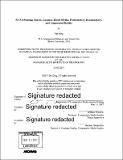Re-enchanting spaces : location-based media, participatory documentary, and augmented reality
Author(s)
Ding, Sue, S.M. Massachusetts Institute of Technology
DownloadFull printable version (10.78Mb)
Alternative title
Location-based media, participatory documentary, and augmented reality
Other Contributors
Massachusetts Institute of Technology. Department of Comparative Media Studies.
Advisor
William Uricchio.
Terms of use
Metadata
Show full item recordAbstract
Location-based media have always played a key role in defining both spaces and publics. Due to the proliferation of sophisticated locative technologies, location-based media are increasingly ubiquitous in areas including art, gaming, urban planning, marketing, and tourism. While location-based approaches have enormous potential, however, rapid technological change and widely dispersed communities of practice have limited critical discourse. This thesis explores how we can better theorize and create innovative and compelling location-based media. I situate location-based media within the broad category of spatial narrative, identifying key concepts and approaches through historical and contemporary examples. In showing that location-based media have always been a form of augmenting our physical environments, I argue that augmented reality as a concept is far broader than current industry discourse indicates, and suggest location-based media as a lens through which to rethink AR's affordances and potentials. In keeping with an emphasis on new forms of storytelling, I propose a taxonomy for location-based media that distinguishes three different levels of participation and user agency: Consumption, Interaction, and Participation. Participatory works that allow users to shape the narrative-becoming deeply invested as co-creators--challenge traditional notions of authorship, consumption, linearity, and temporality. They embrace the affordances of networked locative technologies, provide a platform for a multitude of voices, and draw on the profound power of both community and place. Three case studies-Round-ware, Yellow Arrow, and the 96 Acres Project-highlight the affordances and challenges of participatory location-based approaches. Throughout this thesis, I endeavor to show that participatory location-based media offer vast creative, social, and political potential. Drawing on the rich tradition of spatial narrative, as well as the affordances of locative technologies, they invite us to reexamine our conceptions of narrative, documentary, and space itself.
Description
Thesis: S.M. in Comparative Media Studies, Massachusetts Institute of Technology, Department of Humanities, 2017. Cataloged from PDF version of thesis. Includes bibliographical references (pages 116-122).
Date issued
2017Department
Massachusetts Institute of Technology. Program in Comparative Media Studies/WritingPublisher
Massachusetts Institute of Technology
Keywords
Humanities., Comparative Media Studies.